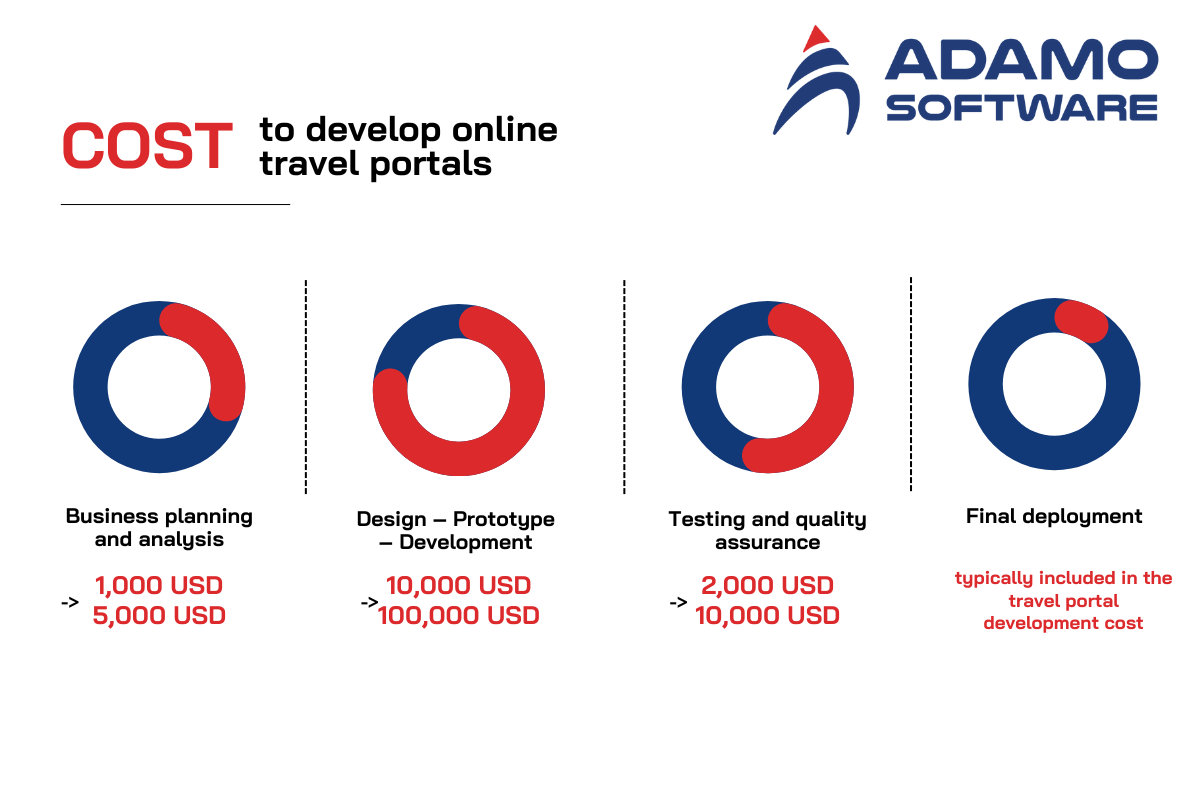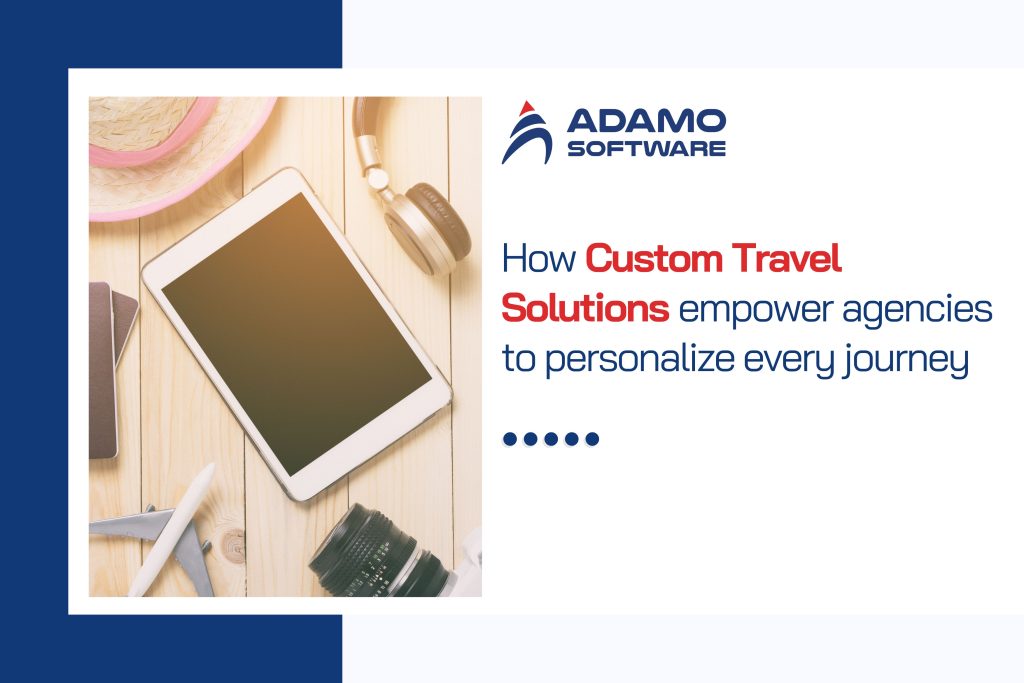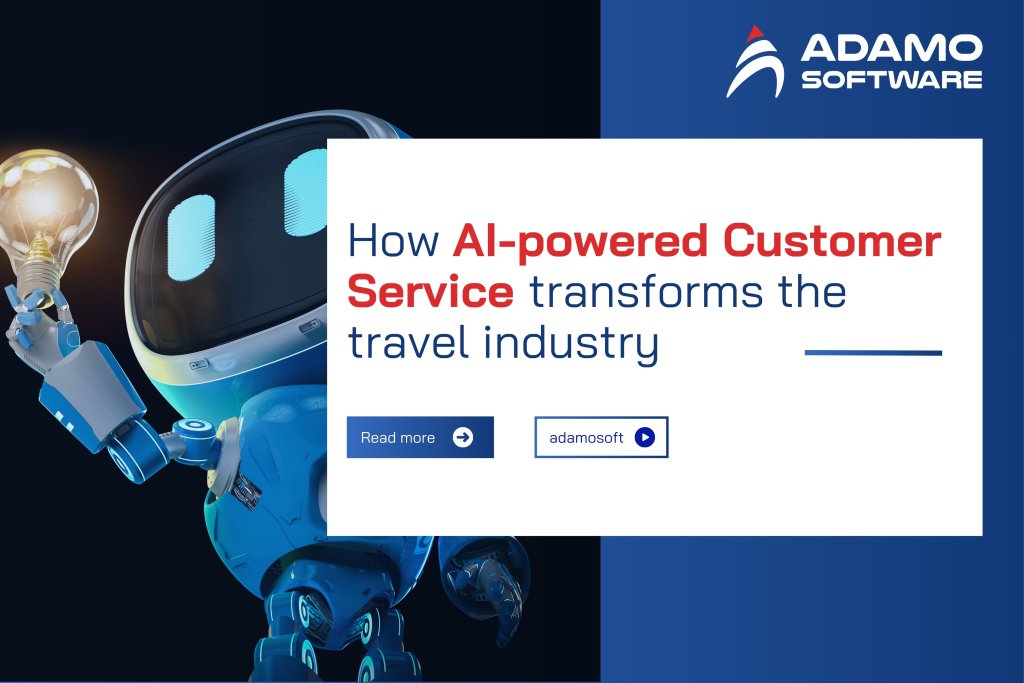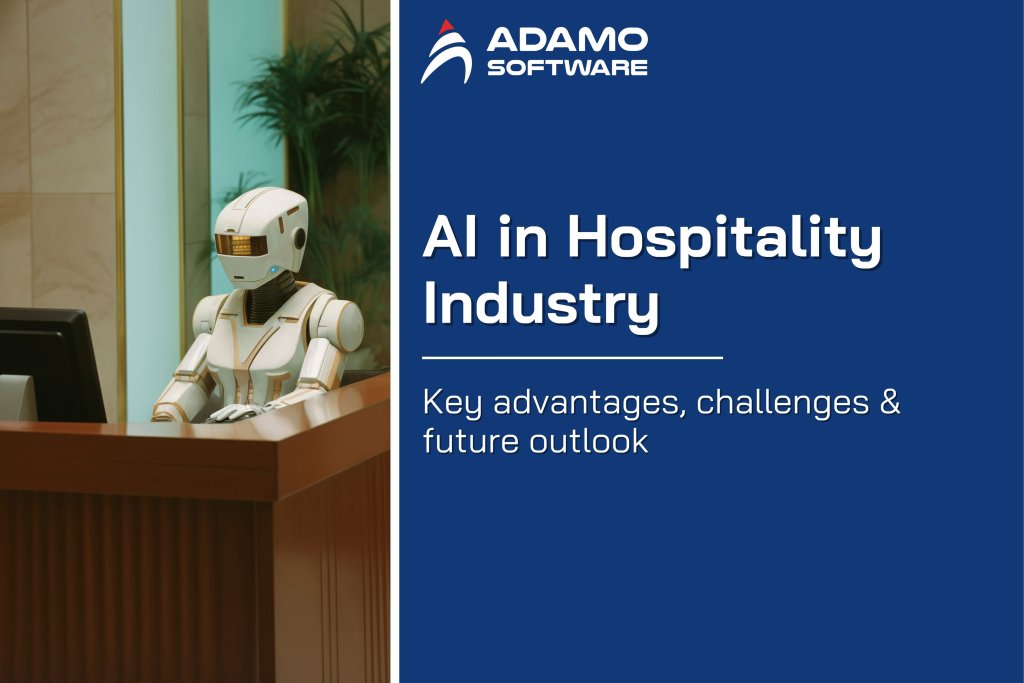Travel Portal Development Cost: Estimate Costs to Create Travel Portals

“Everything comes with a price”. Creating a successful travel portal requires careful planning, meticulous execution, and a clear understanding of the associated costs. Whether you’re a travel agency or an entrepreneur venturing into the travel industry, it’s essential to have a realistic estimate of the expenses involved in developing a travel portal.
From the complexity of the portal to the features and functionalities required, we’ll explore the key considerations that determine the overall expenses. With this understanding, you can make informed decisions and effectively budget for your travel portal project.
So, if you’re curious about how to estimate the costs of developing a travel portal or looking to gain insights into the factors that influence the expenses, read on.
I. How to enter the OTA? How much does it cost to build online travel portals?
In recent years, the OTA market has become very promising and competitive due to improvements in various innovative technologies.
After decreasing to 225 billion USD because of Covid-19 pandemics, the global online travel market revenue bounced back in 2022, then rocketed in 2023, reaching 599.27 billion USD. This figure was predicted to continuously rise steadily in the next years to 800 billion ISD by 2028.
Around 148.3 million online travel bookings get made every year. In 2021, OTAs represented 24% of total reservations in the United States, which is an increase from their 20% share in 2020.
Top OTA market contributors come from United States, Canada, Germany, Mexico, France, Russia, United Kingdom, Italy, China, Japan, Korea, India, Southeast Asia, Australia, Brazil and Saudi Arabia. Hotels, flights and car rentals were the most popular travel products booked online through the internet in the US in 2022
II. Explore types of travel portal development cost: B2B vs B2C travel portal
A travel portal is an online platform providing a one-stop travel-related services, typically in the form of a website or app. It allows users to compare and book flights, hotels, car rentals, cruises, vacation packages, and other travel services from a wide range of companies.
White-label Travel portal Solution can be designed for two main types of users, including individual travelers (B2C portals), travel agents (B2B portals). Each type has its own functions and features for their specific target customers, affecting total travel portal development cost.
1. What is a B2B travel portal?
B2B travel portal is an online booking engine which offers white-label solutions for travel agents. It allows agents to connect with numerous travel service providers from anywhere around the world. Besides, it supports travel partners in creating their own networks to boost their sales and revenue together.
Examples: TravelPerk, TravelBank, Travelpro, Travel Boutique Online and more.
The concept of B2B travel portal development is highly effective for travel businesses and agencies. It involves the creation of web-based solutions and mobile applications that facilitate the formation of new business relationships between different companies and streamline services for clients.
2. What is a B2C travel portal?
On the other hand, B2C travel portal is a type of eCommerce system allowing travel businesses to cut down on costs and create attractive deals for customers to boost sales. This approach enables companies to sell their products and services directly to consumers through online portals, without the need of wholesalers or distributors.
Examples: Traveloka, FlightsLogic, OneClick, PROVAB, and more.
B2C portals make it easier for customers to search and compare different options as they typically integrate with multiple travel suppliers and consolidate information. B2C travel portals often provide real-time availability, pricing, and instant confirmation of bookings, allowing consumers to manage their trip arrangements with online booking features.
III. Travel portal development cost: Things to Consider
Travel portal development cost depends on the specific requirements of your business and the company you hire to build the application. Main factors that affect the cost to be considered:

1. Choose the travel commerce platforms influencing the travel portal development cost
The travel portal development cost is based on the services you want to offer, such as flight booking, hotel booking, car rental, cruise booking, bus reservation, holiday packages, and more. Depending on your own business vision and services, the platform can be chosen.
Flight booking – impacting travel portal development cost
It is a prominent platform in the travel industry that offers comprehensive distribution and technology solutions for the global tourism sector. An airline reservation system typically incorporates XML integration, which is commonly facilitated by API or GDS (Global Distribution System) consolidators. API/GDS serves as a network operated by a company that enables automated transactions between third parties and booking agents, facilitating the provision of travel-related services to end consumers.
The travel portal development cost of a basic flight reservation system with API integration typically ranges from 6,000 to 9,000 USD. If you opt for a booking engine with GDS integration, such as Amadeus, you can expect to add approximately 25% to the cost.
Note that pricing may vary based on specific requirements and additional features desired. It is advisable to explore different options and consult with relevant providers to obtain accurate and up-to-date pricing information.
Hotel booking
Online hotel booking systems have become a popular method for booking hotel rooms. This computerized system serves as a repository and distributor of information for hotels, resorts, and other lodging facilities. In the case of large hotel chains, they typically have direct connections to airline national distribution systems (GDS) such as Sabre, Galileo, Amadeus, and Worldspan. These GDS platforms, in turn, provide hotel information directly to numerous online travel agencies (OTA) through their XML integration, which is integrated into travel booking software.
The travel portal development cost of a hotel booking engine with a basic design typically ranges from 5,000 to 7,000 USD. Any customization in terms of design, functionality, or additional features can incur additional costs.
Car rental, cruise, and bus booking systems
In order to offer a comprehensive travel booking experience, the inclusion of car rental, cruise, and bus booking modules is crucial for expanding business reach. According to a study report, travel portals that provide these comprehensive services tend to attract more visitors compared to those with a single service provider booking engine. So it can impact on the travel portal development cost as it will depend on the car rental or cruises,
Generally, adding a car rental software or cruise/bus booking engine to a travel portal costs between 3,000 to 5,000 USD each. However, it’s important to note that the cost may vary if you opt for a single module system development.
It’s advisable to consider your specific business requirements and consult with relevant service providers to obtain accurate pricing information tailored to your needs.
2. Travel-based business model – Might impact on the travel portal development cost
As aforementioned types of travel portals for B2B and B2C, the costs for these types of business also differ.
B2B travel portal
When it comes to B2B travel portal development, the cost can be around 5,000 USD to 20,000 USD, which is about 30% higher than the cost of B2C portal development. The reason for the higher cost is the more complex features involved in B2B portals.
B2C travel portal
For B2C travel portal development cost, you can add 15% to above cost, which might be around 3000 USD to 15000 USD.
3. Integrated technologies with travel portal development cost
Developing a successful travel portal requires more than just a great user interface. It also requires a strong technological foundation. To build a travel portal software, a combination of various technologies should be utilized based on the specific business requirements. It is crucial to select the right technology stack and partner with a reputable custom software development company to ensure the best results.
The front end or client-side of the portal includes designs, structures, and other elements to make the user interface viewable. The programming involved in the front end typically includes HTML, CSS, Java script, and other relevant technologies. Additionally, integrating AI (Artificial Intelligence) and ML (Machine Learning) technologies can enhance the portal’s performance. AI-driven chatbots, in particular, are considered one of the top tools for improving customer experience.
There is no specific price range mentioned in the search results, but it is recommended to consult with a travel portal development company to get a better understanding of the cost involved.
IV. Cost to develop for the travel portal development cost
Depending on the complexity and scale of the travel portal, the overall travel portal development cost can vary. It is advisable to discuss your requirements with the development team to determine the specific cost implications.

1. Business planning and analysis
– Collecting requirements and defining scope of the project, the creating a plan
– Analysis and understanding the requirements of travel portal template
– Defining purpose and objectives of the travel portal
– Identifying target users
– Understanding desired features and functions
– Determining the required resources, numbers of development team
Cost: 1,000 USD -> 5,000 USD
2. Design – Prototype – Development
– Designing UX and UI for the travel portal
– Coding front-end and back-end
– Building database
– Integration with APIs
– Implementing security measures
– Optimizing performance
Cost: The cost of this phase can vary significantly depending on the complexity and desired functionality of the platform.
Basic Travel Portal
A basic travel portal, with essential features such as flight and hotel booking, user registration, and search functionality, can cost anywhere from 10,000 USD to 30,000 USD. This type of portal typically has a simple and user-friendly interface but may lack more advanced functionalities.
Intermediate Travel Portal
An intermediate travel portal, which includes additional features like car rental, travel insurance, and payment gateway integration, will have a higher cost range. This type of portal may also incorporate CRM capabilities and more advanced search options. The estimated cost for an intermediate travel portal can range from 30,000 USD to 70,000 USD
Advanced Travel Portal
An advanced travel portal with complex features and integrations, such as multi-language support, dynamic packaging, third-party API integrations, and advanced analytics, requires a higher budget. The cost range for this level of portal can vary from 70,000 USD to 100,000 USD or more.
3. Testing and quality assurance
– Testing aspects such as navigation, forms, booking process and payment transactions, and more.
– Optimizing portal’s performance for better user satisfaction
– Identifying weaknesses in the portal’s security infrastructure, data encryption, authentication, and more.
Cost: 2,000 USD -> 10,000 USD
4. Final deployment
– Deploying the travel portal to a server
– Making the travel portal available on the internet
– Setting up infrastructure, configuring serves and database
– Tracking user interactions, website traffic and analyzing customer journey and behavior.
– Conducting regular updates and maintenance
Cost: The cost for this phase is typically included in the travel portal development cost but may vary depending on hosting requirements and server setup.
V. Must-have features of travel portal development cost
A good travel portal development solution must include essential features for both users and administrators.
1. Search filter
A travel portal should provide search filters that allow users to refine their search results based on their references. These filters can include options such as destinations, travel dates, hotel options, car rental services, and more.
2. Ticket booking
A travel portal would be useless without ticket booking and booking management feature that is connected to the top airline, hotel and tour operators,…
3. In-built translator
Having an in-built translator is a valuable and sought-after feature for any travel portal. It plays a crucial role in improving the performance and reach of your portal. The integration of a translator within the portal is an innovative solution that addresses the challenge of language barriers for travelers. It enables them to navigate and explore destinations where different languages are spoken with ease.
4. Payment gateway integration
To facilitate secure online transactions, a travel portal should integrate with reliable payment gateways. This allows users to make payments for their bookings directly through the portal.
5. GPS integration
GPS integration is beneficial for travel portals as it allows users to access location-based services, such as finding nearby attractions, restaurants, and transportation options. It can also provide real-time updates on travel routes and directions.
6. SMS gateway incorporation
When traveling from one country to another, it is essential to ensure that communication between travelers and their service providers remains uninterrupted. This feature allows travelers to make necessary adjustments to their SMS settings while still maintaining a seamless connection with their service providers.
7. CRM integration
CRM integration can help travel portals manage customer interactions, track customer preferences, and provide personalized recommendations. This can enhance customer satisfaction and loyalty.
8. Administration control
Managing a travel portal can be a challenging task, but with efficient administration, the control panel feature can serve as a virtual assistance for the portal administrator. The control panel acts as a powerful tool that streamlines various administrative tasks and enhances the overall efficiency of managing the portal.
9. User accounts
User accounts are essential for personalized experiences and to enable features such as saving preferences, managing bookings, and accessing exclusive offers. A travel portal should provide user account functionality for both customers and travel agents.
10. Agent management
To effectively handle agents’ information and ensure regular data updates, it is crucial for B2B portals to implement an agent management feature. This feature enables seamless management of agents, their profiles, and the data associated with them.
11. API integration
Integrating APIs is crucial for a travel portal as it allows for seamless integration with various travel service providers to help users search, compare, and book travel services directly through the portal.
12. Analytics and reporting
Analytics and reporting can provide valuable insights into user behavior, booking trends, and performance metrics. This data can be used to optimize the portal’s functionality and marketing strategies.
VII. Why Choose Adamo as a Reliable Travel Portal Development Company?
Adamo is a reliable travel portal development company that offers a combination of experience, expertise, a proven track record, comprehensive services, customization options, focus on user experience, and timely delivery and support. Besides, Adamo Software, a premier travel and hospitality software development company, can build different travel portal development solutions such as B2B travel portal, B2C travel portal, travel app development solutions and the while-label travel portal. By choosing Adamo, you can have confidence in their ability to deliver a high-quality, feature-rich, and reasonable travel portal development cost that meets your specific business needs.





